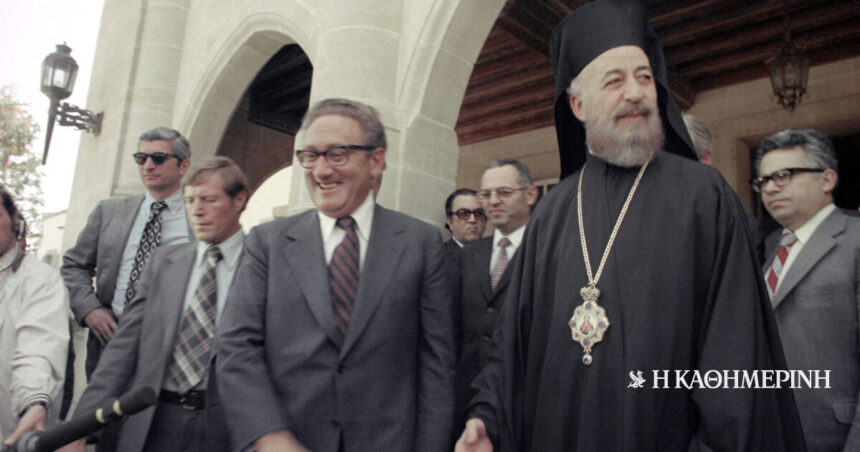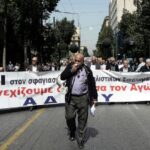A year has passed since his death Henry Kissingerbut the Thomas Alan Schwartz he has not lost his interest in the life and especially the state of the controversial former US Secretary of State. He also recorded it in book “Henry Kissinger and American Power: A Political Biography» (ed. Hill and Wang, 2020) and it is perhaps the quality of the biographer that today makes Schwartz feel “impressed” by the polarization that the American diplomat causes even from the other world. Of course, the negative evaluations of “the late” Kissinger, says to “K” Schwartz, they don’t just come from the Leftalthough it still enjoys the respect of more institutional bodies, such as Johns Hopkins Universitywho this year founded an international relations research center named after him. “I think it will be some time before the passions about Kissinger’s role die down enough to have a more rational discussion about his achievements and failures,” Schwartz said. Himself, as distinguished professor of History, who teaches Political Science and European Studies at Vanderbilt University in the USAwill participate in the conference organized by Institution of the Parliament on December 13 and 14, on the subject of Southern Europe’s transition to democracy in the period 1974-1977. The speech of the American historian is entitled “Henry Kissinger and the Cyprus Crisis: Realism in Foreign Policy and America’s Domestic Policies». So let’s see some of his thoughts on the matter.
– Which international affairs worried Washington in the 1970s and what percentage of them would we say concerned Greece and Cyprus?
– What I would emphasize is the extent to which Nixon and Kissinger’s foreign policy revolved around the idea of withdrawing the US from broad commitments and the possibility of military intervention in various parts of the world. American public opinion was now decidedly opposed to the extent that American military interventions had taken, so US objectives were much more limited. And I think that Nixon and Kissinger were above all about maintaining the status quo in the sense that they understood it. When they looked towards Greece and Cyprus, they did not want changes that would cause difficulties. And I think their biggest concern – to the extent that they ever really thought about Greece and Cyprus in particular, which there’s not much evidence of before 1974 – was to maintain some stability. They didn’t really care about issues like the promotion of democracy, the rights of minorities, what Archbishop Makarios was ready to do. They just wanted to maintain stability in the region and not weaken the eastern wing of NATO by a conflict between Greece and Turkey.
– How much did the Watergate scandal affect their foreign policy in the Mediterranean?
– The question is interesting and has, of course, caused controversy. In his memoirs, Kissinger argues that the problems since Watergate, which destroyed Nixon – especially from the beginning of 1973 until his resignation in August 1974 – seriously weakened American foreign policy by causing a great distraction that reduced its effectiveness throughout the world, not only in the Mediterranean. Since then some have argued, as I have in my book, that one of the consequences of Watergate was indeed that it gave Henry Kissinger considerable power. I call him the “foreign policy chairman” because at that time, to some extent at least, Kissinger was effectively in charge while Nixon was trying to deal with the scandal. This meant that Kissinger’s priorities were determined by what he thought he should do. And I think his main concern has always been the Cold War and great power relations. His concern for what was going on between Greece and Turkey or in Cyprus was relatively minor, at least until these issues affected something bigger. The concentration of power in his hands during this period – he was both national security adviser and secretary of state – meant that his attention span was limited to what interested him at the time. That is, when the crisis broke out in Cyprus, in the issue of the Middle East, which concerned him a lot, especially as he was trying to achieve the conclusion of disengagement agreements between Israel and Egypt and Syria.
– In a conversation on August 13, 1974, with now President Ford, he famously said “there is no important American reason why Turkey should not own a third of Cyprus”. But he also said that “we are trying to bail out the situation in Cyprus after it got out of control. The British have made a fool of them.” So was realpolitik guiding him from the start? Or even he believed that the case of Cyprus was already difficult?
– What those conversations show us is how much Kissinger was immersed in his own geopolitical logic, which was always based on questions like “what is the strongest state with which we can ally”, “what is most important for American national interests’ etc. It was a rather narrow-minded view of American interests – the idea that “there is no important American reason for Turkey not to own…” – a blinkered way of looking at the whole issue. I wouldn’t say it was wrong, because most Americans wouldn’t really believe that the Cyprus settlement would affect the US much. But I think that the degree to which the developments could provoke public opinion was underestimated, especially if they were considered a violation of human rights, ethnic cleansing, things that actually happened in Cyprus and which would have some impact on the image of Kissinger and the American foreign policy policy in the Mediterranean. I think that the phrases you quoted show the extent to which Kissinger, coming from his diplomatic successes in the Middle East, saw Cyprus essentially as a lose-lose situation. He told Gerald Ford that Turkey was more important to the US, not realizing the extent of the political difficulties this would cause. It was one of those cases where Kissinger was influenced by his own centralism and was only interested in the issue before him at the time. So much so that he really did not understand or recognize some of the political aspects of the situation in Cyprus until it was too late.
– Why had he refused to meet with the exiled Konstantinos Karamanlis in Paris? Did he prefer another leader for post-political Greece?
– I had not specifically asked him about this subject, which rarely appears in other biographies of him, through the few journalists who touched on it at the time. In his memoirs Kissinger is somewhat disparaging of Karamanlis, whom he had actually met in Paris in the late 1960s or early 1970s on some social occasion before the question of his return arose. He describes him as vain and somewhat detached from what was happening in his own country, characteristics that Kissinger often recognized in exiled politicians who essentially lost touch with developments. The fact that he did not meet with him afterward, or that he did not realize that Karamanlis would return to power, is indicative of Kissinger’s relative lack of interest in democratic leaders in situations where he thought countries would not survive the transition to democracy and that he would he had authoritarian figures in front of him. In that sense I think he dismissed Karamanlis as ineffective, thus underestimating him on this issue. And this was characteristic of Kissinger’s tendency to show, so to speak, less commitment to democratic institutions and developments.
The rhetoric of the Trump administration will be very nationalistic. But that doesn’t mean they won’t worry about the international impact of America’s actions.
– What should we keep in mind to understand American foreign policy today?
– I believe that the Europeans in particular will be a little upset with the rhetoric that Washington will now choose. One of the precautions I would suggest to most European observers is to look primarily at the deeds. The rhetoric of the Trump administration will be very nationalistic, Trump himself and his advisers will speak in nationalistic terms. They will say about America coming first, about American interests, that “there is no important American reason why we should be interested in Cyprus.” But that doesn’t mean they won’t worry about the international impact of America’s actions. Marco Rubio, who will become secretary of state, and Mike Waltz, who will be national security adviser, are passionate about achieving peace through strength and want to see the US stand up to various aggressors around the world. world and especially against this new axis of resistance of Russia, Iran, China and North Korea. So I think we will see some action. And it will be interesting to know what kind of solution they come up with for Ukraine and whether they can actually end the war in a way that preserves if not all of its territory, at least its national sovereignty.
The lecture of Mr. Thomas Schwartz “Henry Kissinger and the Cyprus crisis: foreign policy realism and American domestic policies” will take place on Saturday, December 14 as part of the conference “Global Crisis and Democratic Transition in Southern Europe: a Political History” at the Hellenic Parliament (13-15 /12).
Central photo: Henry Kissinger with Archbishop Makarios in Nicosia, on May 7, 1974. It is still the time when, according to Thomas Alan Schwartz, the American Secretary of State was not particularly concerned about what was happening in our region. “The concentration of power in his hands – he was also national security adviser – meant that his attention span was limited to what interested him at the time.” [A.P. Photo]




